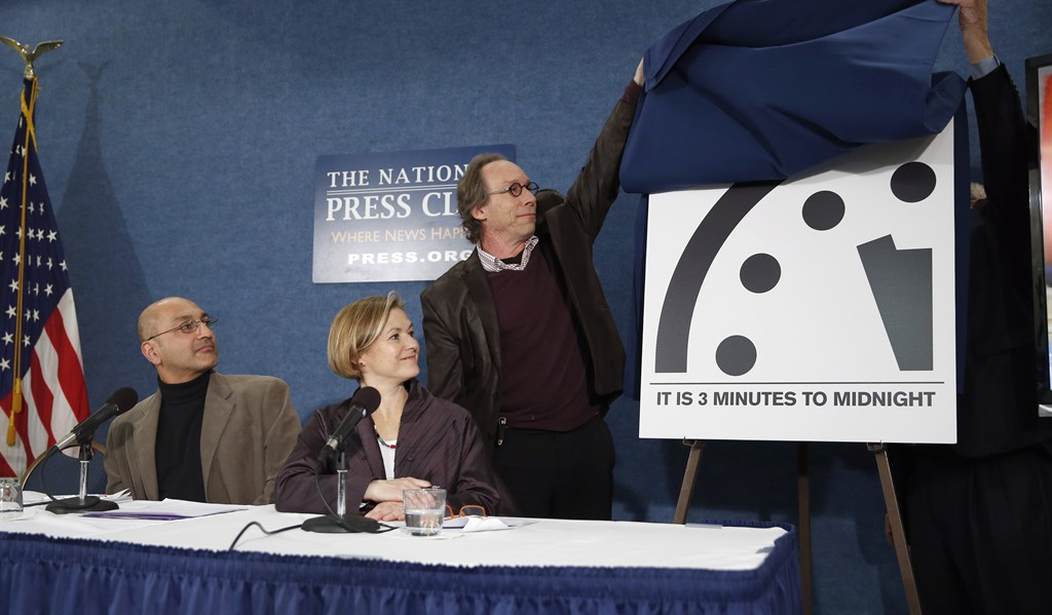
Ever since 1947, the Bulletin of Atomic Scientists has maintained a ritual of updating their famous “Doomsday Clock” each year, supposedly indicating how close mankind is to wiping itself out. Let year they set the clock at 90 seconds. This year they left it there. Assuming you put any stock in such things, you might be tempted to take that as some partially good news. Sure, we’re on the verge of societal extinction, but at least it’s no worse than last year. Of course, last year wasn’t much to brag about either. However, this schtick feels like it’s long since grown old and I’m not sure how many people really take it seriously anymore. With that said, it’s hard to argue that the world is in pretty bad shape at the moment and there are multiple disasters unfolding that could blow up in our faces both figuratively and literally. (AP)
Advertisement
Earth, for the second year running, is nearing apocalypse, a science-oriented advocacy group said, pointing to its famous “Doomsday Clock” that shows 90 seconds till midnight.
The Bulletin of Atomic Scientists made the annual announcement Tuesday rating how close humanity is from ending. It cited nuclear threat in Russia’s war on Ukraine as well as the Oct. 7 attack in Israel and war in Gaza, worsening climate-related disasters and the danger of generative artificial intelligence.
“Last year, we expressed amplified concern by moving the clock to 90 seconds to midnight, the closest to global catastrophe it has ever been,” said Rachel Bronson, CEO of the Bulletin group. “The risks from last year continue with unabated veracity and continue to shape this year.”
It’s worth remembering that making literal doomsday proclamations and sending people into a panic is pretty much the only reason for the Bulletin of Atomic Scientists’ existence. They put out a bi-monthly newsletter if you’d care to subscribe and they publish the occasional articles on their website, but that’s basically it. Their original focus was the threat of nuclear war and that remains a primary topic to this day. But they’ve expanded their scope to fretting about climate change, pandemics, and most recently, Artificial Intelligence.
It’s not that these aren’t very serious topics of concern. They obviously are. Any significant exchange of nuclear weapons would have long-term implications for the entire world. The last pandemic turned out to be something of a bust, but China is tinkering with far more deadly pathogens all the time and there probably isn’t much we could do about it if one of them broke loose. (Again.) And I’ve already worked my fingers to the bone writing here about the very valid concerns that exist regarding AI.
Advertisement
The problem is that all three of these subjects are ones that humanity doesn’t seem equipped to do much if anything about. The list of countries with nuclear weapons continues to slowly grow. Talk of “limiting” the number of nukes is rather silly when you consider that we already have enough of them to destroy the world multiple times. And nobody is going to give up their weapons while adversarial nations retain their own. Mutual assured destruction remains our only feasible deterrent.
The pandemic scenario is equally intractable. This isn’t just a problem with China. Russia and the United States play with those viruses as well, along with other advanced nations. The work is done almost entirely in secret and goes largely unregulated in any effective fashion. How can you shut something like that down? And as far as Artificial Intelligence goes, that genie is already out of the bottle. It’s being worked on all over the world. Shouting warnings from the rooftop isn’t going to do much to help us when the killer robots eventually show up.
I’m not saying that we should simply ignore all of these issues. They are important and represent very clear and present dangers to humanity. But the Bulletin of Atomic Scientists and their doomsday clock aren’t delivering any solutions. They’re just promoting alarmism. And I fail to see how that’s making the world a better or safer place.
Advertisement


